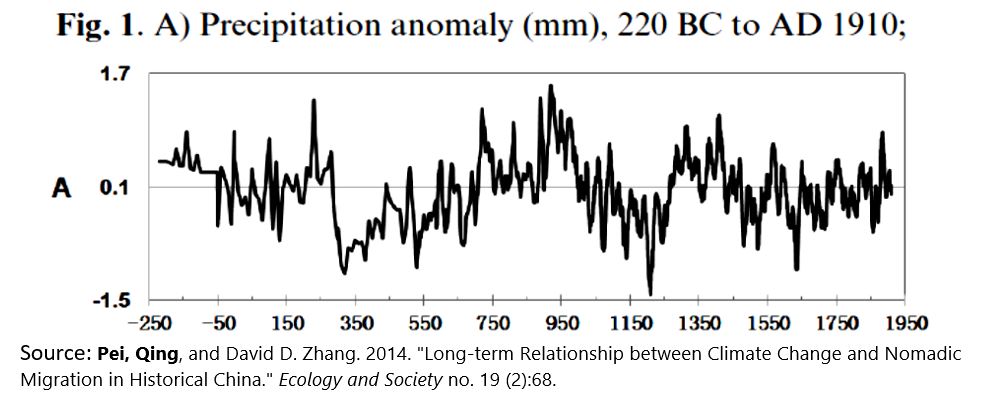Two FLASS scholars awarded HSSPFS funding to study Panentheism and Precipitation Reconstruction in China
In the Research Grants Council’s latest funding round, two FLASS scholars—Dr Chan Man-ho, Associate Professor from the Department of Science and Environmental Studies (SES) and Dr Pei Qing, Associate Professor and Associate Head of the Department of Social Sciences (SSC)—were granted financial support from the Humanities and Social Sciences Prestigious Fellowship Scheme (HSSPFS). Introduced in 2012/13, the scheme grants extended time-off and supporting funds to outstanding investigators under the disciplines of the Humanities and Social Sciences Panel, enabling them to focus on their research and writing works. Each awardee will receive support for a period of up to 12 months, including relief from teaching and administrative duties, with research funding covering the cost of hiring relief teachers and other research staff. The scheme also covers expenditures on research-related equipment, travel, subsistence and dissemination.
Dr Chan Man-ho from SES is the principal investigator of one of these two HSSPFS-funded projects. On his project, entitled “Evaluating the Panentheistic Properties of Our Natural World”, he elaborated: “In religious studies, the term Panentheism refers to the belief of the existence of God, or gods or a god-like mind, who is inter-related with every part of the universe. This belief holds that the transcendent being(s) and the physical world influence one another mutually and continuously. This view is shared to various degrees by many traditional religions, including Hinduism, Buddhism, Confucianism and Christianity, and even by some atheists.”

The scholar, who holds two doctoral degrees in astrophysics and philosophy, said that while it is a prevalent belief among the public that science and faith are incompatible, there are numerous academic studies dedicated to the dialogue between science and religion instead of highlighting their conflicts. “Panentheism embraces methodological naturalism, a golden rule adopted in science. According to Panentheism, the continuous and dynamical acts and creation that originate from the transcendent mind come into existence completely via natural mechanisms. Thus, through exploring the panentheistic properties of our natural world, we can enter the dialogue between science and religion,” he explained.
Dr Chan’s project will evaluate the importance of meditation, an increasingly popular topic, and revisit the properties of the natural world. Through the study, he expects to gain a better understanding about the spiritual dimension of our natural world and the ultimate truth in reality. He anticipates that the results will facilitate discussions and communications between the scientific and religious communities.

Dr Chan was also granted funding from the General Research Fund from its latest round of applications, which will support his project “Detecting Dark Matter Signals by Radio Observations”. For decades, dark matter has been one of the most intriguing scientific mysteries that has captivated the attention of many scientists in astrophysics and particle physics. It is a topic that arouses considerable public interest.
“In this project, we propose to analyse the radio continuum spectral data of galaxy clusters previously observed to search for signals from dark matter annihilation. New radio data of several galaxy clusters will also be observed with a wide range of frequencies using the Nanshan Radio Telescope. If any dark matter signals can be identified, we will be able to significantly further our understanding of the nature of dark matter, and facilitate the discovery of new particles in future collider experiments,” Dr Chan explained.
The other HSSPFS-funded project is led by Dr Pei Qing from SSC. The project, named “A Bayesian Approach to Precipitation Reconstruction in China During the Little Ice Age Based on Archives of Societies”, will utilize the full extent of humanities and environmental studies to reconstruct precipitation in China during the Little Ice Age (1400–1900 CE) period at a multi-scalar scale (national/regional) based on the historical archives of societies.

Dr Pei explained that although China has comprehensive historical records on climate and weather, precipitation reconstruction has received less attention compared with temperature. Current reconstruction methods that are based on the natural archives/proxies do not fully take advantage of data retrieved from the archives of societies. “This project will utilise a new method, a Bayesian approach, to capture the full range of inferences obtainable from the analysis of the historical archives of societies,” he said.
The new approach of using historical documents to perform climate reconstruction is expected to benefit scholars worldwide. The results of the project will supplement the knowledge on past precipitation from Chinese archives of societies and provide a historical reference for human society to understand the potential impacts of the current state of climate change.
Dr Pei is a historical geographer who is dedicated to linking sciences with humanities in the fields of physical and human geography. His research interests mainly encompass social responses to climate change, methodology development in climate history, as well as environmental change and global history.